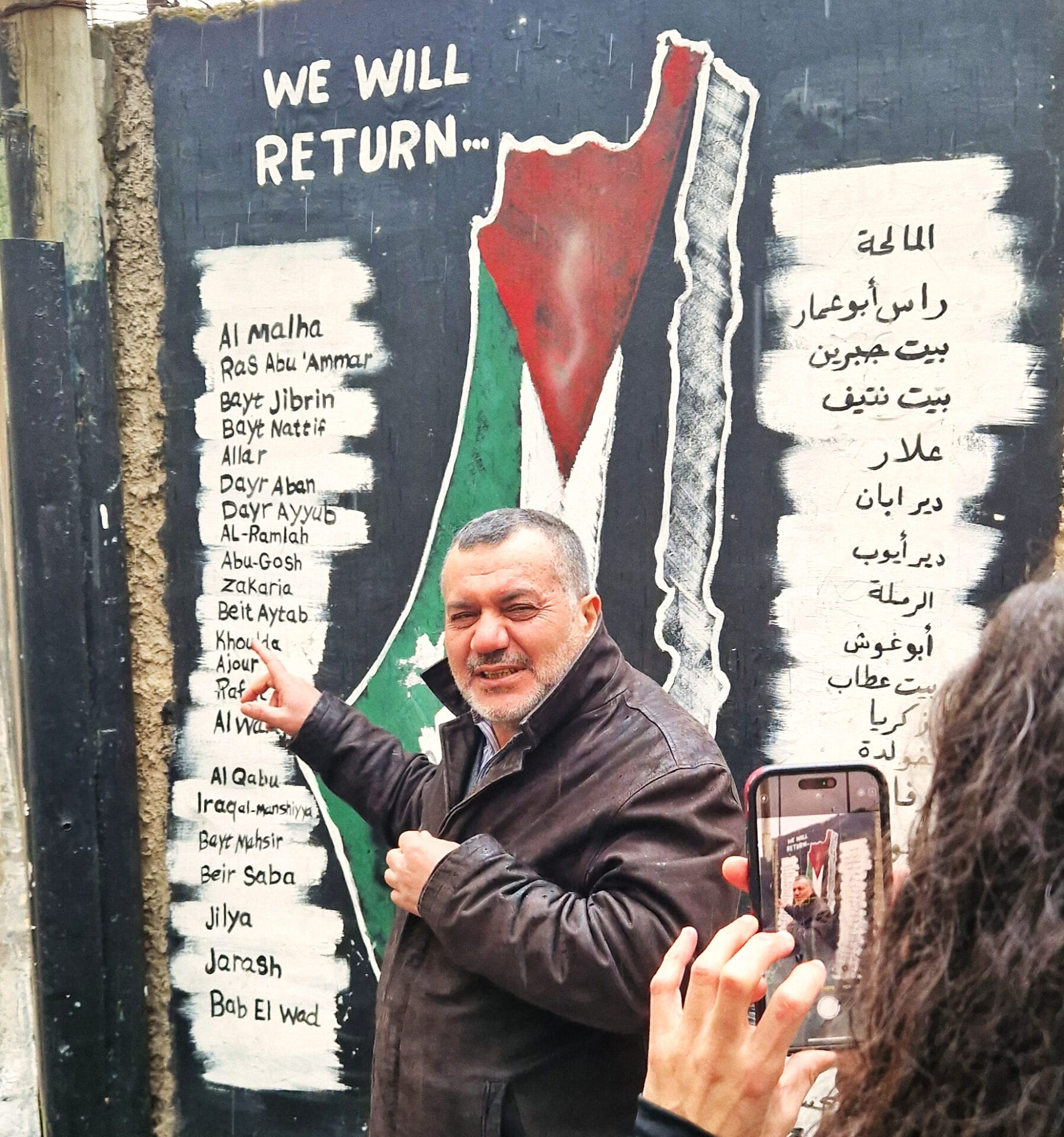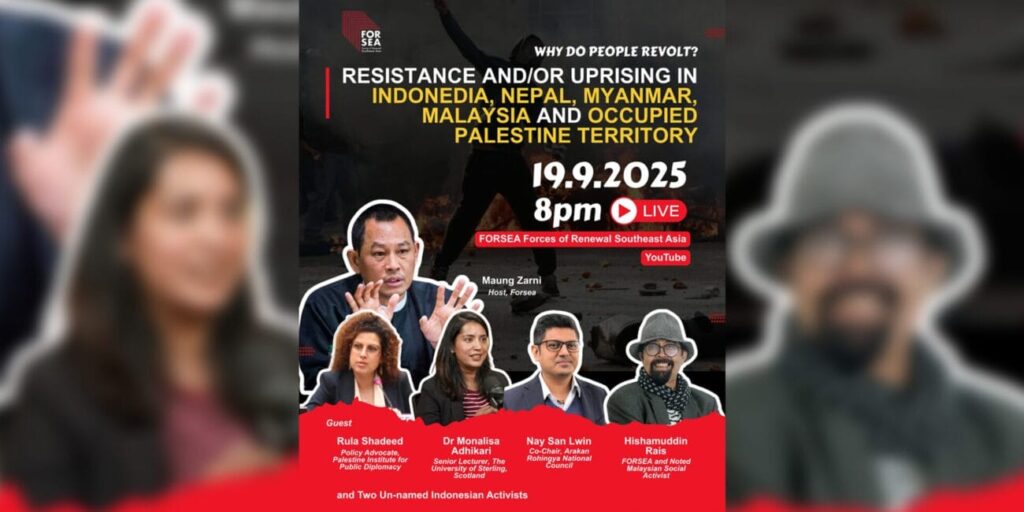But quickly we realized that these regional markers or boundaries are themselves silos that the colonial or imperialist White Man has created for us to stick to “our issues”.
Our own regional leaders, mostly unelected and/or authoritarian populists, both civilian and military men, from the Association of South East Asian Nations, occasionally bark back at the “masters of mankind” in the so-called Global North, built on 500-years of loot, theft, land grab and planetary resource rape. But they generally play along in the Masters’ Game, for the crumbs.
ASEAN as a regional bloc of 11 member states – including Indonesia and Myanmar, which were two founding members of the Bandung Conference of anti-imperialist Asia and African nations from the 1950’s – has neither the humanistic vision nor the intellectual leadership that enables the grouping to punch above its weight.
Out of its utter and complete absence of any ideals or principles or humanistic enlightenment, the ASEAN has chosen to remain quiet in all genocides, both in its Southeast Asian backyard and in other parts of the world.
Beyond legal obligation placed on all UN member states, genocides are an affront to humanity. Alas, for politicians that relegate their humanity to corporate and national profits, it’s all business-as-usual.
Enter the never-acknowledged, CIA-assisted Indonesian genocide of native-born Chinese in 1965 to the American War-induced Khmer Rouge genocide in Cambodia in 1975, from Myanmar’s slow-burning Rohingya genocide – still ongoing – to Israel-US-joint genocide in Gaza and colonial occupation of the entire Palestine.
Citizens are always intellectually and ideologically ahead of those who run Frankenstein creatures which political scientists and academics call “states”.
Donald Trump, the new Genocidaire-in-Chief, who replaced Genocide Joe in the White House, has reportedly been invited to attend the ASEAN Summit in Kuala Lumpur next month. Enlightened Malaysian citizens are gearing up to give him a citizens’ un-welcome, if the Master accepts the invitation from Malaysia as ASEAN Chair.

2006 Ashoka Fellow Dr Abdelfattah Abusrour, told our delegation, “we refuse to be victims.”
(photo by Zarni)
FORSEA fully understand that We the People are inside the world’s history where the oppressed & the oppressor, the exploited and the exploiter, the colonized and the colonizer inevitably confront one another.
We embrace the Big Struggles, not just stay within our little silos of ethno-national concerns and interests.
Friday’s dialogue was our continual attempt to break from the colonialist silos of “area or geography or national focus”, the activist equivalent of the “area studies” in the White Academy.
For human communities under oppression, the only way to connect with wider global struggles is through universal humanism and principles that value life, liberty and love (of fellow humans), not through interests.
That widely reviled Nuremberg-worthy American criminal, Dr Henry Kissinger, was dead wrong when he promoted the view that “no permanent friends, only permanent interests.”
Interests keep changing, only values, ideals and principles give a revolutionary movement(s) a stable moral anchor. In fact, ideals that guide liberation struggles and anti-dictatorship revolts are both a moral imperative and a strategic necessity.
Myanmar’s anti-dictatorship movements have become a lamentable example of multiple-revolts adrift without any inspirational moral ideals, shared empathy or a strategic map, from the now ousted Aung San Suu Kyi and the current political leadership of the opposition National Unity Government to most of the ethnic identity-based armed organizations fighting the repressive military junta.
FORSEA is sharing the transcript of the opening address by our Palestinian sister in struggle Rula Shadeed of Palestine Institute for Public Diplomacy, which captured the essence of what FORSEA stands for and what we strive – a fundamental change in the relations between the oppressed and the oppressor, the exploited and the exploiter, and the humanists and the anti-human corporate imperialist “masters of the mankind”.
As Rula Shadeed observed, “the only solution (for freedom from colonial repression and genocidal corporate profiteering) is intersectional struggle. Together we are far more powerful than the global minority regimes that survive only by oppressing others.”
Watch the full video below
Transcript – Rula Shadeed | 19 Sep 2025
Thank you very much, Zarni. I am very honoured and privileged to be part of this important call about struggles across Asia. What we try to focus on is the importance of intersectional struggles – how we can work together in solidarity, share knowledge, and resist the oppressor. Unfortunately, we see that oppressors learn from each other and apply similar oppressive regimes on people.
Even when facing existential threats, as we are in Palestine and in other countries represented here, we must unite to deal with the situation, and learn from our brothers, sisters, and comrades around the world.
My name is Rula Shadeed, co-director of the Palestine Institute for Public Diplomacy. I am a jurist in international criminal law. Our work focuses on introducing a liberatory narrative on Palestine, and on lobbying and mobilising states and movements worldwide to fight oppression in Palestine, while connecting with other struggles globally.
I was asked to comment briefly on the UN General Assembly decision yesterday, and on the US veto in the Security Council. Of course, this came as no surprise – we knew the US would veto. What’s striking is that the language of the resolution did not mention genocide or the ongoing killings, but instead focused mainly on forced famine – the man-made famine imposed by Israel – and the catastrophic humanitarian situation. It avoided addressing genocide, accountability, or sanctions, which are the only meaningful way forward.
Israel is waging what looks like a war against the world, with the United States playing a central role not only in Palestine but across the region and globally.
To explain what is happening in Palestine: the struggle has been ongoing for more than eight decades. Palestinians first resisted British colonial rule, then the Zionist colonial regime established in the aftermath of the world wars. For the past 80+years, Palestinians have been fighting against colonisation.
The discourse has been distorted, especially by US and Israeli propaganda, which reduces the issue to a “conflict.” This frames it as a two-sided dispute rather than colonisation. But the Palestinian situation is clearly one of colonisation. If we misdiagnose it as a conflict, we cannot address it correctly. Colonisation ends only with liberation.
All of Israel’s practices – displacement, ethnic cleansing, genocide, apartheid, occupation, theft of natural resources, and transfer of the population – fall under colonisation. The current genocide is a continuation of the Nakba. The Nakba began in 1948 when, with British support, Zionist militias took over Palestinian towns and villages and expelled more than 80% of the population – around 800,000 people – who remain refugees to this day. This is why Palestinians form one of the largest refugee exoduses in the world. Even before 1948, Palestinians rose up – notably in 1936 against the British presence and its atrocities. Since then, Palestinians have continued to fight for liberation.
It’s easy to despair today. Perhaps we only see 1% of the horrors in Gaza and the West Bank. But we must remember: Palestinians have fought for 100 years against the most powerful forces globally, and they are still surviving. Despite unimaginable atrocities, despite Israeli colonisation, US hegemony, global crackdowns, and hostile media narratives, Palestinians remain steadfast in bringing dignity and freedom to their people.
Just last week, the United States even sanctioned Palestinian human rights organisations – an unprecedented move. They are treating us like a superpower, sanctioning NGOs as though they were Russia. This shows the extreme levels of control and dominance aimed at breaking Palestinians and preventing liberation.
I would end by saying two things:
The coloniser is brutal – among the most dangerous oppressors in the world –exporting oppression globally. The only solution is intersectional struggle. Together we are far more powerful than the global minority regimes that survive only by oppressing others.
At the Palestine Institute for Public Diplomacy, we focus on alternative diplomacy in the Global South. We have a presence in Latin America and will soon expand into East Asia. From our work in Brazil, Colombia, and Argentina with indigenous movements, we’ve seen how their oppression is often directly fuelled or financed by Israeli companies and the Israeli state.
For example, in Patagonia, Argentina, the Mapuche people are being ethnically cleansed from their land because an Israeli-linked water company signed an agreement with the Argentine government to extract resources. The Mapuche have now been designated as a terrorist organisation by the state.
This pattern is global: Israel exports intelligence, weaponry, and oppressive technology everywhere, including Asia. The oppressor is one.
So the only way forward is for us also to unite, coordinate efforts, identify common targets, and pool our resources to support each other in times of need – and to show people everywhere that liberation is possible.
Thank you, Zarni, and apologies if I went longer than expected.
___________________________________________
 A Buddhist humanist from Burma (Myanmar), Maung Zarni, nominated for the 2024 Nobel Peace Prize, is a member of the TRANSCEND Network for Peace Development Environment, former Visiting Lecturer with Harvard Medical School, specializing in racism and violence in Burma and Sri Lanka, and Non-resident Scholar in Genocide Studies with Documentation Center – Cambodia. Zarni is the co-founder of FORSEA, a grass-roots organization of Southeast Asian human rights defenders, coordinator for Strategic Affairs for Free Rohingya Coalition, and an adviser to the European Centre for the Study of Extremism, Cambridge. Zarni holds a PhD (U Wisconsin at Madison) and a MA (U California), and has held various teaching, research and visiting fellowships at the universities in Asia, Europe and USA including Oxford, LSE, UCL Institute of Education, National-Louis, Malaya, and Brunei. He is the recipient of the “Cultivation of Harmony” award from the Parliament of the World’s Religions (2015). His analyses have appeared in leading newspapers including the New York Times, The Guardian and the Times. Among his academic publications on Rohingya genocide are The Slow-Burning Genocide of Myanmar’s Rohingyas (Pacific Rim Law and Policy Journal), An Evolution of Rohingya Persecution in Myanmar: From Strategic Embrace to Genocide, (Middle East Institute, American University), and Myanmar’s State-directed Persecution of Rohingyas and Other Muslims (Brown World Affairs Journal). He co-authored, with Natalie Brinham, Essays on Myanmar Genocide.
A Buddhist humanist from Burma (Myanmar), Maung Zarni, nominated for the 2024 Nobel Peace Prize, is a member of the TRANSCEND Network for Peace Development Environment, former Visiting Lecturer with Harvard Medical School, specializing in racism and violence in Burma and Sri Lanka, and Non-resident Scholar in Genocide Studies with Documentation Center – Cambodia. Zarni is the co-founder of FORSEA, a grass-roots organization of Southeast Asian human rights defenders, coordinator for Strategic Affairs for Free Rohingya Coalition, and an adviser to the European Centre for the Study of Extremism, Cambridge. Zarni holds a PhD (U Wisconsin at Madison) and a MA (U California), and has held various teaching, research and visiting fellowships at the universities in Asia, Europe and USA including Oxford, LSE, UCL Institute of Education, National-Louis, Malaya, and Brunei. He is the recipient of the “Cultivation of Harmony” award from the Parliament of the World’s Religions (2015). His analyses have appeared in leading newspapers including the New York Times, The Guardian and the Times. Among his academic publications on Rohingya genocide are The Slow-Burning Genocide of Myanmar’s Rohingyas (Pacific Rim Law and Policy Journal), An Evolution of Rohingya Persecution in Myanmar: From Strategic Embrace to Genocide, (Middle East Institute, American University), and Myanmar’s State-directed Persecution of Rohingyas and Other Muslims (Brown World Affairs Journal). He co-authored, with Natalie Brinham, Essays on Myanmar Genocide.
